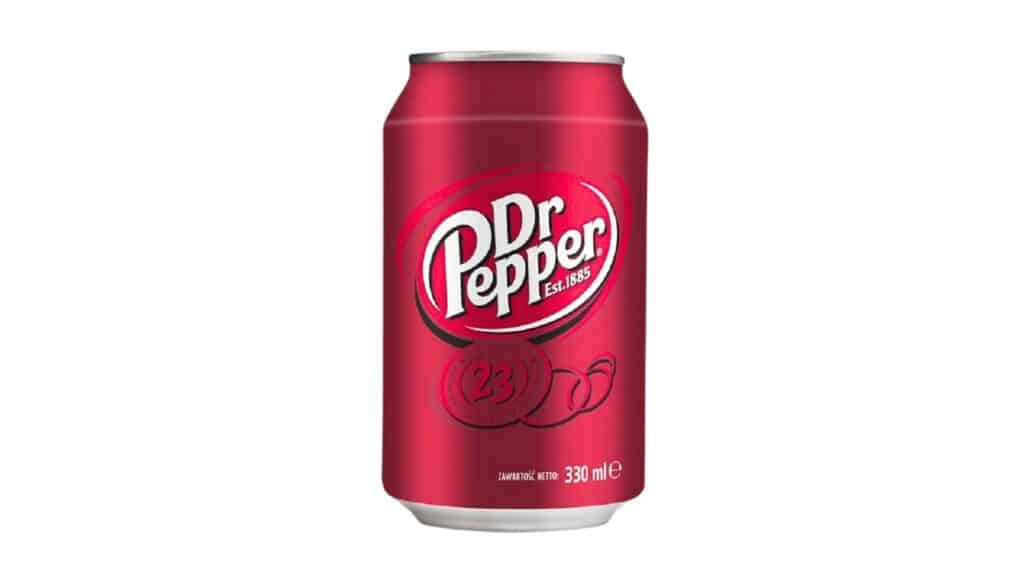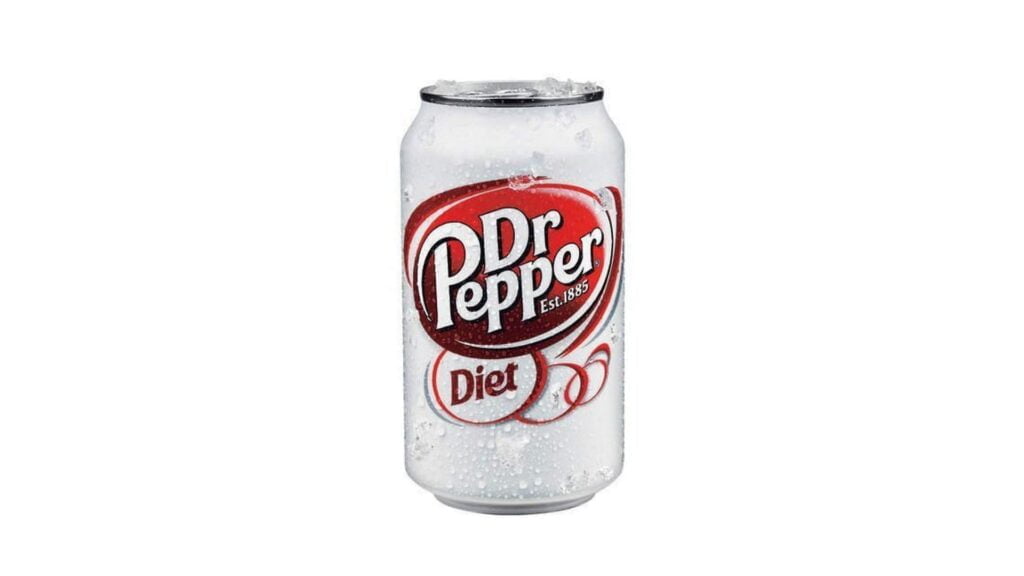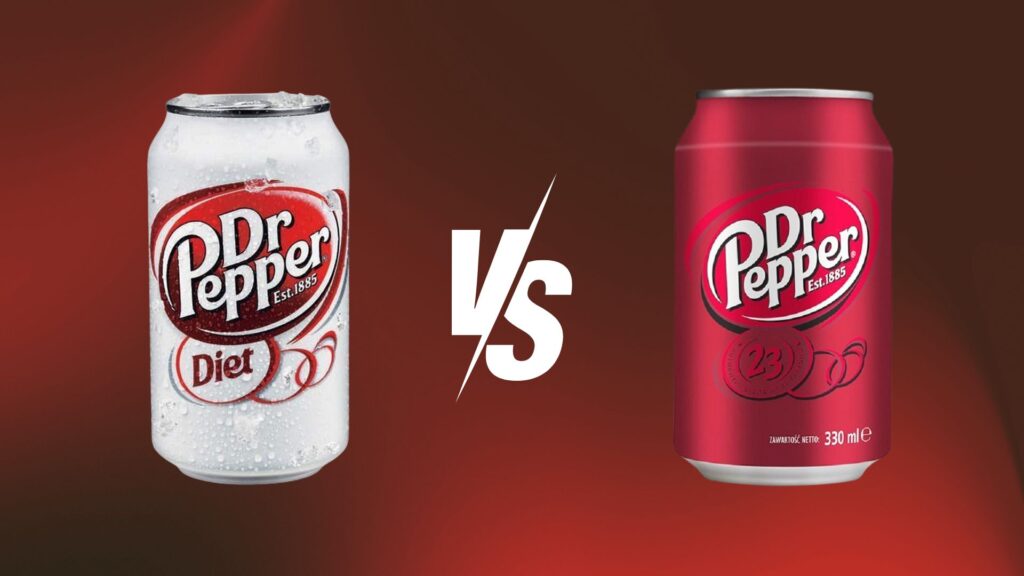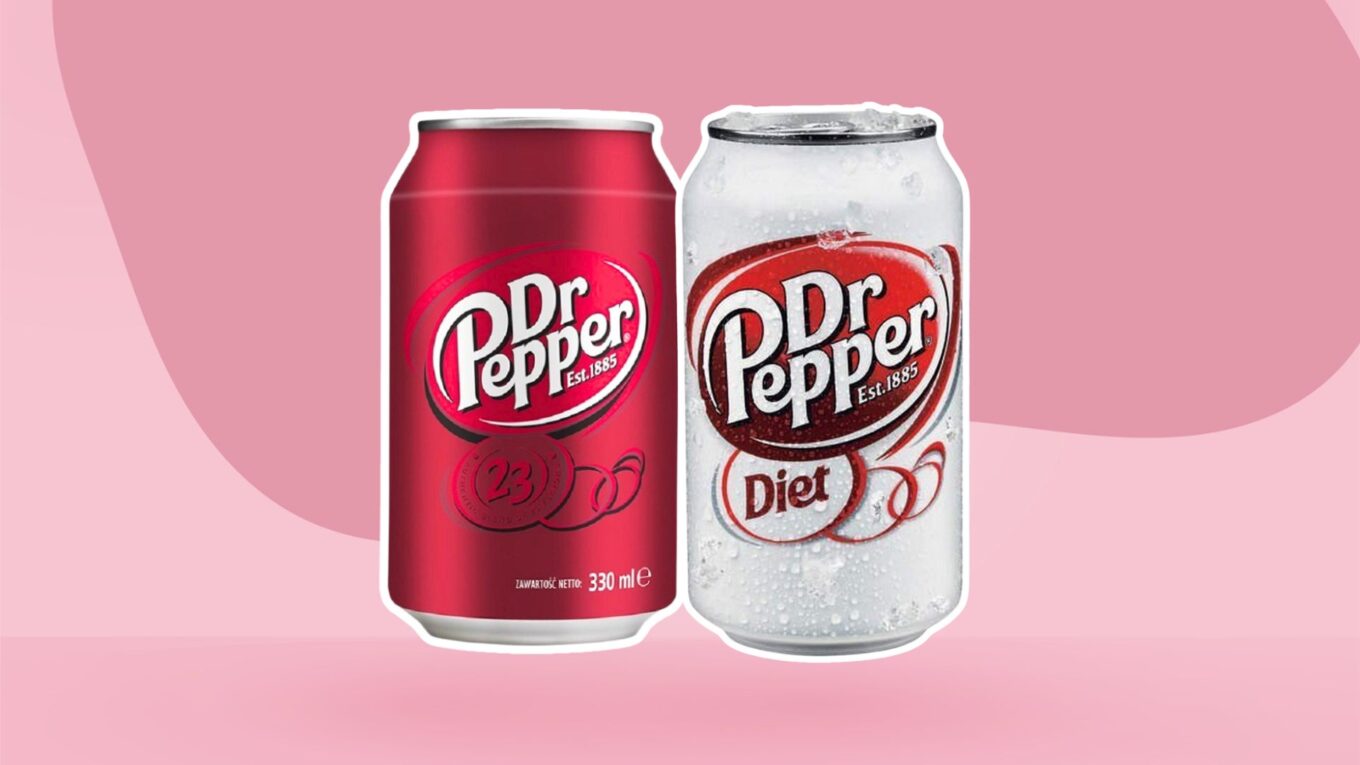Searching for a refreshing, low-calorie soda option without compromising on taste? You’re not alone.
Many people want to enjoy their favorite beverages while monitoring their sugar and calorie intake.
Diet Dr Pepper offers the perfect solution – the same delicious flavor as regular Dr Pepper without the added sugar and calories.
In this article, we’ll explore the key differences between Diet Dr Pepper and its regular counterpart, focusing on their caffeine content.
By the end of this comparison, you’ll clearly understand how these two popular sodas stack up in caffeine, helping you make an informed choice that suits your preferences and lifestyle.
Overview of Dr. Pepper
Dr. Pepper, a beloved soft drink, has been quenching thirst and delighting taste buds for over a century.
Dr. Pepper has evolved throughout its history to cater to changing consumer preferences and needs.
The brand has introduced various variants, each offering a distinct twist on the classic flavor.
From the rich and creamy Dr. Pepper Cream Soda to the bold and fruity Dr. Pepper Cherry, these options have allowed fans to explore new taste experiences while staying true to the original’s essence.
One notable variant that has gained significant attention is Diet Dr. Pepper.
Introduced as a low-calorie alternative, Diet Dr. Pepper aims to provide the same great taste as the regular version without the added sugar and calories.
This variant has become a popular choice among health-conscious consumers and those looking to manage their calorie intake without sacrificing the flavor of their favorite soda.
Caffeine Content in Regular Dr. Pepper

A 12 fl oz can of Regular Dr. Pepper contains 42 mg of caffeine, making it a moderately caffeinated beverage.
To put this into perspective, a typical 8-oz cup of coffee contains around 95 mg of caffeine, while a 12-fl oz Coca-Cola has about 34 mg.
This comparison shows that while Regular Dr. Pepper is not the most heavily caffeinated soda, it still provides a noticeable energy boost.
Caffeine plays a significant role in the appeal of sodas like Regular Dr. Pepper.
Many consumers rely on these beverages for a quick pick-me-up or to help them stay alert throughout the day.
However, it’s essential to be mindful of the potential effects of caffeine on health and well-being.
Caffeine Content in Diet Dr. Pepper

Diet Dr. Pepper contains slightly less caffeine than its regular counterpart, with 36 mg per 12 fl oz can.
This difference in caffeine content may be attributed to the formulation changes necessary to create a low-calorie soda version.
While the manufacturer does not disclose the exact reasons for the reduced caffeine content, it is likely a result of the delicate balance required to maintain the desired taste profile while using alternative sweeteners.
When considering the health implications of consuming Diet Dr. Pepper, it’s important to consider more than just the caffeine content.
While the lower caffeine levels may appeal to some, the use of artificial sweeteners in diet sodas has been a topic of ongoing debate.
Comparison of Caffeine: Diet Dr Pepper vs. Regular Dr Pepper

| Attribute | Regular Dr. Pepper | Diet Dr. Pepper |
|---|---|---|
| Caffeine per 12 fl oz can | 42 mg | 36 mg |
| Relative Caffeine Content (compared to coffee) | Less than half of coffee (~44%) | Less than half of coffee (~38%) |
| Health Considerations | It may cause jitters, anxiety, and sleep disruptions if consumed in excess | Lower caffeine; concerns about artificial sweeteners affecting metabolism and health |
| Typical Consumer | Prefers original flavor, less concerned about calorie intake | Calorie-conscious prefer fewer sugars |
Health Considerations While Consuming Caffeine

Safe Consumption Intake
Caffeine, a natural stimulant found in various foods and beverages, including Dr. Pepper, has been the subject of much research and discussion in the health community.
While moderate caffeine consumption (up to 400 mg/day for most healthy adults) is generally considered safe, it’s essential to understand the potential effects on the body.
Excessive Intake Risks
Caffeine consumption can improve alertness, concentration, and overall cognitive function.
Many people rely on caffeinated beverages like Dr. Pepper to help them stay focused and productive throughout the day.
However, excessive caffeine intake can lead to several health concerns, such as sleep disturbances, anxiety, heart palpitations, and digestive issues.
Long-term heavy consumption may also contribute to chronic health problems like high blood pressure and increased risk of certain diseases.
Sensitive Groups that Need to Be Cautious
It’s important to note that certain groups may be more sensitive to caffeine’s effects or have specific health considerations that warrant limiting or avoiding it altogether.
Pregnant women, for example, are advised to limit their daily caffeine intake to 200 mg or less to minimize potential risks to the developing fetus.
Individuals with hypertension, anxiety disorders, or other medical conditions should consult their healthcare provider for personalized recommendations regarding caffeine consumption.
Understanding the labeling of products like Diet Dr. Pepper and Regular Dr. Pepper is crucial for making informed decisions about caffeine intake.
Pay attention to the serving size and the amount of caffeine per serving to ensure you stay within healthy limits.
Factors Affecting Consumer Preferences
1. Health Factors
One of the primary factors influencing the choice between Regular and Diet Dr. Pepper is the difference in caffeine content and other health-related ingredients.
While both variants contain caffeine, Diet Dr. Pepper has slightly less, which may appeal to those looking to moderate their intake.
Diet Dr. Pepper also uses artificial sweeteners instead of sugar, making it a lower-calorie option.
This can particularly attract health-conscious consumers or those managing conditions like diabetes.
2. Demographic Factors
Demographic trends also play a role in consumer preferences.
Studies have shown that younger generations, particularly millennials and Gen Z, are more likely to opt for lower-sugar, lower-calorie beverages than their older counterparts.
This shift in preference is often driven by a greater awareness of the potential health risks associated with excessive sugar consumption and a desire to maintain a healthier lifestyle.
3. Taste Preferences
Taste preferences, however, remain a significant factor in the choice between Regular and Diet Dr. Pepper.
Many consumers find that the taste of Regular Dr. Pepper is more authentic and satisfying, while others appreciate the lighter, less sweet taste of Diet Dr. Pepper.
Personal anecdotes and consumer testimonials often highlight the importance of taste in the decision-making process, with some individuals prioritizing flavor over health considerations.
4. Market Presence
Recent market research and surveys have shown that while there is a growing interest in diet and low-sugar beverages, Regular Dr. Pepper maintains a strong market presence.
This suggests that many consumers still prefer the classic taste and are willing to indulge in the regular variant despite health trends.
Choosing between Regular and Diet Dr. Pepper depends on personal preferences, health consciousness, and overall beverage enjoyment.
Conclusion
Understanding the caffeine content in your favorite Dr. Pepper variants is crucial for making informed choices that align with your health goals and personal preferences.
While Diet Dr. Pepper and Regular Dr. Pepper offer the same delightful taste, their caffeine content differs slightly, with Diet Dr. Pepper containing a bit less.
By being mindful of your daily caffeine intake and considering factors such as your sensitivity to caffeine and overall health, you can enjoy these beloved sodas while maintaining a balanced lifestyle.
Whether you prefer the classic taste of Regular Dr. Pepper or the low-calorie alternative of Diet Dr. Pepper, remember that moderation is key.
So, the next time you reach for a refreshing can of Dr. Pepper, you can do so confidently, knowing exactly what you’re sipping on.




